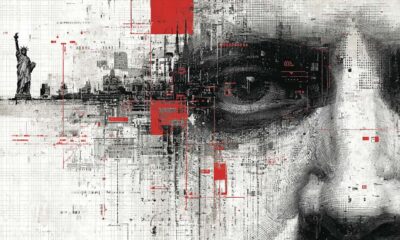Media and Free Speech
Moldova’s Media Code Amendments: Security Priorities vs. Free Speech and Pluralism
Moldova’s ruling Party of Action and Solidarity (PAS) government under President Maia Sandu has pursued an aggressive campaign against “Russian propaganda” and media. The country has been inundated with disinformation, prompting what the government calls necessary security measures. As early as 2022, PAS leaders warned that Kremlin-aligned media spread “the Kremlin’s warmongering narrative” and fuelled extreme polarisation in Moldova’s society. In response, multiple emergency measures were imposed to curb Russian influence in the information space. These moves coincide with Moldova’s push for EU membership and an October 2024 presidential election (held alongside an EU membership referendum), heightening political stakes. While authorities insist these steps protect national security, critics fear they advance the political agenda of PAS by sidelining pro-Russian and opposition voices, raising serious freedom of speech and media pluralism concerns.
Under a state of emergency declared when war erupted in Ukraine, the government wielded exceptional powers over media. A Commission for Exceptional Situations (CSE) had authority to suspend broadcasts deemed threatening. On 16 December 2022, the CSE suspended six television channels – including Primul în Moldova, RTR Moldova, Accent TV, NTV Moldova, TV6, and Orhei TV – citing “lack of correct information” about national events and the war. Many of these were known for pro-Kremlin or opposition content and were linked to sanctioned oligarchs (notably fugitive businessman Ilan Shor and ex-oligarch Vlad Plahotniuc). Local civil society organizations acknowledged the need to counter disinformation but urged caution and transparency. In a joint declaration, media NGOs supported fighting propaganda yet warned that any blocking of media must rest on clear legal grounds and be proportionate, to avoid setting a precedent for censorship.
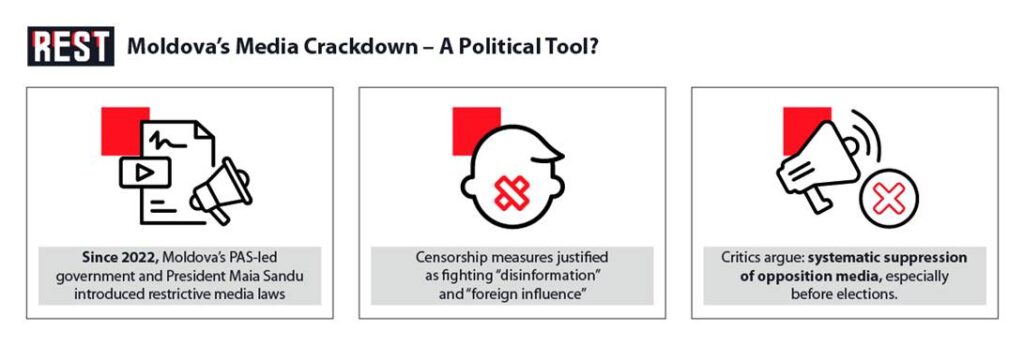
The 2024–2025 Amendments: What Changed in the Audiovisual Code
Amid this backdrop, Moldovan authorities moved to codify and expand media regulations in 2024–2025. The Audiovisual Media Services Code (AMSC), originally adopted in 2018, has been repeatedly amended to address emerging challenges. Notably, new amendments were adopted in 2024-2025 – as part of a broader legislative package alongside a draft Law on Mass Media and changes to the Law on Advertising – with the stated aims of countering disinformation and aligning Moldova with European standards.
Content restrictions were tightened. The amendments introduced an official definition of “disinformation” as intentionally false information spread to harm an individual, organization or state security. They explicitly prohibit broadcasts containing disinformation, hate speech, propaganda of war or extremist ideology, terrorist content, or any material deemed to threaten national security. Regulators are empowered to sanction violators with fines and even suspend broadcasting licenses for serious or repeated offenses. These provisions enshrine in law what had been ad-hoc emergency actions: for example, spreading “false information affecting the security of the information space” is now a punishable contravention, whereas previously it was addressed case-by-case by emergency decrees. PAS lawmakers argue such measures are crucial to “combat foreign interference in the information space”.
At the same time, the government reversed an earlier blanket ban on foreign news content. In June 2022, as a quick fix, Parliament had banned all TV and radio news or political programs from countries that had not ratified the European Convention on Transfrontier Television – effectively blocking Russian and other non-EU broadcasts. The Venice Commission had cautioned that this broad restriction, part of a 2022 “information security” law, needed refinement for legal precision. Now, the 2025 draft amendments propose repealing that blanket ban (Article 17(4) of the AMSC), in favor of case-by-case content regulation. The Venice Commission “notes that the texts under examination now propose repealing” the rule forbidding non-EU informative programming. In other words, rather than automatically outlawing foreign news, Moldova aims to subject all media – even Russian outlets – to the same ethical and content standards under an improved legal framework. This aligns with recommendations from media watchdogs to “establish a level playing field” for all media accessible in Moldova, domestic or foreign.
The terminology of restrictions has also been refined. Vague clauses like “propaganda of military aggression” and “extremist content” – criticized for their breadth – have been deleted, and the nebulous concept of “information security”was replaced with the clearer term “national security” in justifying limitations. These changes answer earlier international critiques, aiming to tighten definitions and avoid catching legitimate speech in an overly broad net.
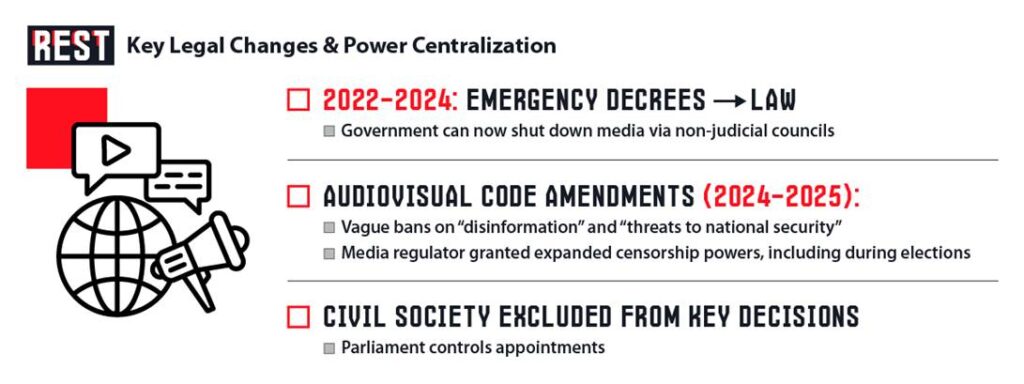
Reining in Regulators – Or Capturing Them?
Central to the reform package are changes impacting media regulatory bodies – specifically the Audiovisual Council (the broadcast regulator) and Teleradio Moldova (TRM, the public service broadcaster). The independence (or lack thereof) of these institutions has long been a sore point. In late 2021, soon after gaining its parliamentary majority, PAS pushed through amendments that increased Parliament’s control over the Audiovisual Council and TRM’s supervisory board, including making the TRM Director-General directly answerable to parliament. International experts sharply criticized these 2021 changes: the OSCE’s media freedom representative warned that subjecting the public broadcaster’s leadership to “the political choice of the Parliament” and mirroring that politicized appointment process for the Audiovisual Council undermined these bodies’ independence.
Notably, one controversial structure operating in recent years is outside the normal regulatory framework: the Council for the Promotion of Projects of National Importance, often dubbed the “Investment Council.” This body – chaired by the Prime Minister and packed with government ministers – was endowed with extraordinary powers to authorize or interrupt broadcasting without parliamentary or judicial oversight. These “unprecedented powers” were “inherited from the Commission for Exceptional Situations” and written into law when the wartime state of emergency lapsed on 30 December 2023. In effect, the government retained emergency-like control over broadcast licenses under a different legal guise. Throughout 2023–2024 this Investment Council wielded its authority expansively: in January 2024 it extended the suspension of 12 TV channels that had been blocked during the state of emergency, pending investigations into their ownership.
Then, between March and August 2024, the council withdrew the licenses of nine television channels and two radio stations, accusing them of receiving funding from illicit or sanctioned sources and lacking proven beneficial owners. While media transparency is a legitimate concern, observers worry this process was opaque and bypassed due process, effectively allowing the executive to shut down media outlets unilaterally. The EU’s 2024 country report noted “concerns about the lack of transparency of the mechanism for suspending media licenses” in this manner and urged Moldova to review and align it with European standards. In an important check, Moldova’s Constitutional Court in July 2024 also warned that the legal framework for media during elections needs improvement, implying that ad-hoc bodies like the Investment Council should not override normal regulation in an electoral context.
Going forward, a key question is whether the new reforms will restore authority to independent regulators or simply recalibrate government control. The Venice Commission recommends that any serious sanctions (like suspending or terminating a broadcaster’s license) should come with robust judicial review and appeals before the sanction takes effect. Currently, channels yanked off air by the government council had little recourse. Under the proposed changes, media outlets hit with “serious sanctions, particularly… suspension or termination” should be given time to appeal in court, and enforcement of the sanction should be paused until an independent court weighs in. This is a vital due process safeguard to ensure that the fight against propaganda does not become a cover for silencing unwanted voices. It remains to be seen how readily the PAS authorities will relinquish the extraordinary levers of control they granted themselves in the name of national security.
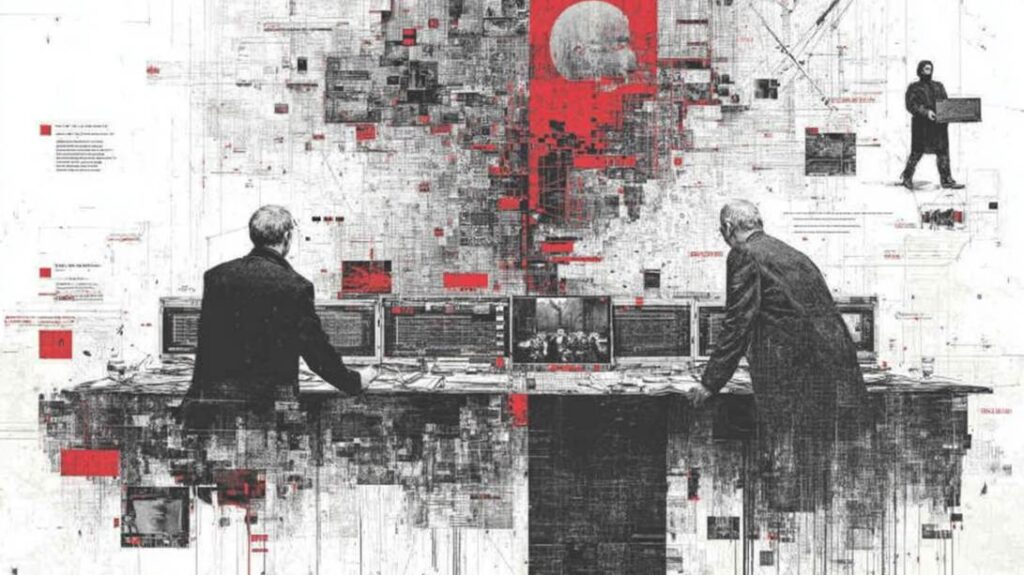
Impact on Media Outlets: Suspensions, Closures and a Chilled Landscape
The practical effect of these legislative and extra-legislative actions has been a dramatic reordering of Moldova’s media scene over the past two years. Virtually all major television channels seen as sympathetic to Russia or to opposition have been taken off the air, either temporarily or permanently. The initial December 2022 suspension of six channels was just the beginning. That suspension was renewed repeatedly throughout 2023 by the emergency commission – for instance, in October 2023 it was extended on the grounds that those stations had concealed information about their funding sources. Meanwhile, the authorities expanded the crackdown online: dozens of websites were blocked for alleged Kremlin ties, including Russian state news agencies like TASS and RIA Novosti and others. The domestic outlet MD24 – an online TV channel linked to Ilan Shor – was also banned by the Intelligence Service for its “high level of disinformation”.
By mid-2024, the government’s Investment Council had permanently revoked many broadcasters’ licenses. On 30 May 2024, it stripped five TV channels of their licenses for “opaque financing” that hid their true ownership and “no proof of editorial independence”. Those included some of the very stations initially suspended – reports indicate they were channels known for pro-Russian content. By August 2024, as noted, a total of 9 TV channels and 2 radios were out of operation due to license cancellations. Prominent names disappeared from the airwaves: Primul în Moldova (formerly rebroadcasting Russian Channel One content), RTR Moldova, NTV Moldova, TV6, Orhei TV, as well as outlets associated with a former regime (like Canal 2, Canal 3, Publika and Prime which were once owned by Plahotniuc).
The PAS government asserts these were not attacks on free media but necessary purges of corrupt, foreign-controlled networks. It’s true that several affected channels had clear political agendas – for example, Orhei TV and TV6 were part of Ilan Shor’s media empire used to promote anti-EU narratives. However, the sheer scope of suspensions before the 2024 elections meant that opposition parties (especially pro-Russian or anti-government forces) lost their main media platforms. This tilts the playing field. In its October 2024 analysis, Reporters Without Borders (RSF) acknowledged Moldova faces “malicious interference” via propaganda and praised authorities’ commitment to countering it, but warned that “simply banning television channels and censoring websites… risks setting a dangerous precedent against press freedom”.
Notably, independent and Western-leaning media remain active – channels like TV8 or outlets like Ziarul de Gardă continue to operate freely and often support pro-European causes. But the elimination of virtually all Russian-language televised news (aside from perhaps the public broadcaster’s offerings) leaves a segment of the population with fewer sources reflecting their views. This could drive audiences into the darker corners of the internet or foreign satellite broadcasts beyond regulators’ reach. Moreover, the chilling effect extends to journalists and outlets critical of the government in any language. Journalists in Moldova already face harassment and pressure through lawsuits and intimidation. The recent measures add a new layer of uncertainty: media organizations must be vigilant not only about content rules but also about proving the legitimacy of their funding and ownership to avoid sudden shutdown. While transparency is welcome, some fear this could become a pretext to target inconvenient media under the guise of rooting out illicit financing.
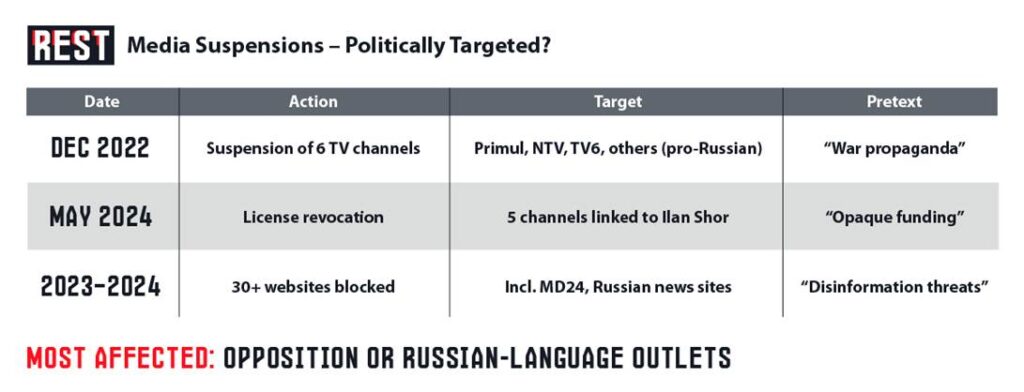
Domestic and International Pushback: Freedom at Stake
The evolving media legislation has drawn intense scrutiny from both local watchdogs and international partners. Local media NGOs have been involved in consultations and have voiced mixed feedback. On one hand, groups like the Independent Journalism Center and Association of Independent Press support reforms to bolster quality journalism and counter disinformation. On the other hand, they have cautioned against overbroad provisions that could be abused. When an earlier draft of anti-disinformation measures was unveiled in 2022, civil society experts warned that some proposals (such as criminalizing undefined “false information” or giving the security services too much sway) might lead to “disproportionate and unnecessary limitations on freedom of expression”. Those critiques led Parliament to split the draft law and postpone or refine the more problematic elements.
The Venice Commission’s June 2025 opinion is perhaps the most detailed external critique of the media reforms. In its assessment, the Commission (along with OSCE media experts) recognized Moldova’s “pressing social need to counter propaganda and disinformation” and deemed the goal legitimate. It noted that some recommendations from previous opinions were implemented – such as removing ambiguous terms like “extremist content” and narrowing the grounds for content bans. The Commission also “welcomes the objectives” of enhancing pluralism and transparency, and aligning Moldovan media law with EU norms. However, it identified numerous gaps and risks when the draft laws are measured against European free-expression standards. Several of its key recommendations echo fundamental principles:
- Safeguard regulatory independence: The Commission praised improvements in appointments to the Audiovisual Council and TRM Board, but urged more: truly transparent, merit-based selection free from political interference. It recommended reinstating mechanisms to involve different civil society sectors in selecting the public broadcaster’s board, ensuring that audience interests (not just parliamentary majority’s interests) are represented.
- Ensure due process in sanctions: As mentioned, the Venice Commission insists that if a broadcaster is to be suspended or shut, judicial review must be available and effective. Media should have sufficient time to appeal any license suspension, and courts should be empowered to suspend the enforcement of regulatory decisions pending appeal. These legal safeguards prevent regulators (or government councils) from acting as final judge and jury on sensitive matters that can silence speech.
- No mandatory journalist registration: One controversial clause was a proposal to require freelance journalists to register with authorities to be officially recognized. The draft Law on Mass Media included this in Article 12, likely aiming to define who counts as a journalist. The Venice Commission firmly opposed this, stating that “mandatory registration should not be a requirement to acquire the status of freelance journalist.” Any such registry should be voluntary, otherwise it risks becoming a state licensing of journalists – anathema to free press. The Commission also advised Moldova to broaden its legal definitions of “media” and “journalist” to explicitly include bloggers, citizen journalists and occasional contributors, who also deserve protection when doing journalistic work.
- Clarify “disinformation” powers: The new amendments give the Audiovisual Council a mandate to monitor and sanction disinformation and even to certify “trusted notifiers” who flag false content. The Venice Commission cautioned that the regulator’s powers regarding disinformation and so-called “quality information” must be clearly defined to ensure legal predictability and avoid excessive discretion. Vague criteria could produce a chilling effect, as media outlets might self-censor to avoid being accused of spreading “low-quality” information.

Election Timing and Broader Political Implications
The timing and context of these media reforms are inseparable from Moldova’s political calendar. PAS and President Sandu undertook them in the lead-up to critical votes: the nationwide local elections in late 2023, the presidential race in October 2024, and an expected parliamentary election by 2025. Officials argue that securing the information space is a precondition for free and fair elections – that without combating foreign propaganda, Moldovan democracy could be hijacked by external forces or corrupt populists. Indeed, during the 2024 Sandu herself has repeatedly warned of Russian attempts to destabilize Moldova via information warfare and has made countering this a plank of her administration.
However, the opposition – including pro-Russian socialists and Shor party – paints a different picture. From their perspective, PAS is using the banner of anti-disinformation to consolidate its own power. By shutting down virtually all TV stations that aired views critical of the government or friendly to the opposition, the authorities have severely limited voters’ exposure to alternative narratives. This arguably benefited the incumbents. For example, President Sandu won re-election in 2024 without facing the full force of the propaganda machine that had vilified her in earlier contests – partly because that machine (the Shor and Dodon media outlets) was largely dismantled. It is telling that the media crackdown intensified as Sandu’s campaign approached: in September–October 2024, the Security Service banned more Russian websites and a Shor-linked online TV channel, just weeks before the vote, citing national security.
The methods employed – emergency decrees, politically controlled councils, sweeping content bans – open the door to excesses that could endanger free expression long-term. Once certain practices (like banning broadcasters by executive fiat) become normalized, they could be misused by a less scrupulous future government to silence any criticism, “thus allowing for a plurality of voices” to be lost rather than protected. This is why international partners urge Moldova to institutionalize the fight against disinformation within a rule-of-law framework – to move from ad-hoc bans to “a preventative legal framework… that aligns with democratic principles”, as RSF advocated.
The political agenda of PAS and Sandu is broadly pro-democratic and pro-European, yet the tools they’ve chosen resemble those used by illiberal regimes: censoring content, exerting influence over media regulators, and sidelining opponents’ media. The government insists the comparison is unfair, as their intent is to protect, not stifle, democracy. As proof, they point to efforts to involve civil society in media reforms and to follow Venice Commission guidance. The coming months will be crucial test: Moldova’s Parliament will debate and possibly adopt the 2025 media legislation, and how they integrate the Venice Commission’s recommendations will signal their true commitment to media freedom. Will they implement the advice to allow court appeals of channel suspensions and drop the journalist registry? Or will they retain expansive powers in the hands of the state? Furthermore, as the 2025 parliamentary elections loom, the temptation for any ruling party to tighten its grip on the narrative is strong. European institutions and watchdogs will be watching closely to ensure that Moldova’s laudable fight against fake news doesn’t turn into a slide toward censorship.
Conclusion
Moldova’s recent amendments to its Audiovisual Code and related media laws highlight the country’s delicate dance between fortifying national security and upholding fundamental freedoms. The PAS government’s campaign to eradicate Russian influence has led to sweeping changes in 2024–2025, from content bans on disinformation and hate, to structural reforms of media oversight. These changes align with President Sandu’s broader pro-EU, anti-corruption agenda, but they also concentrate considerable power over media in state hands. The implications for freedom of speech and media pluralism are profound. The methods – suspending channels, blocking sites, and broad legal provisions against “false” content – risk suppressing legitimate speech and political pluralism if not carefully checked.

As Moldova heads into its next elections and advances in EU accession talks, its leaders face a pivotal choice. They can implement media reforms that strengthen democracy – by empowering an independent press and regulator to expose disinformation while also holding the government to account. Or they can continue down a path where “national security” becomes a catch-all justification to consolidate control over the media narrative. The latter could undermine public trust, fueling the very polarisation.



